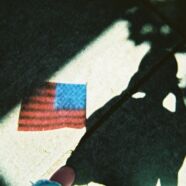Interview
South Writ Large interviewed Clay Risen about his newest book, Red Scare: Blacklists, McCarthyism, and the Making of Modern America.
What inspired you to write your new book, Red Scare: Blacklists, McCarthyism, and the Making of Modern America?
I’ve been writing about postwar American history for a long time, and at a certain point I realized that the Red Scare was everywhere, even when it was just background, like political dark matter. The fears it generated echoed long after it ended. Look at the way Lyndon Johnson refused to back out of Vietnam for fear that he would be labeled weak on communism. But I also realized that it had been a long time since anyone had assessed the Red Scare head on, and that a book that gathered all the new materials and research on the topic over the last twenty-five years might be a good idea.
Do you have a family connection to this topic?
My paternal grandfather was an FBI agent for much of his career, beginning during World War II. Afterward he was one of the many agents who investigated the loyalty of federal employees. He died a long time before I started working on the book; I wish I’d had a chance to ask him so many questions.
Do you think the Red Scare era was experienced differently in the US South?
Definitely. Accusations of being soft on communism, or being a communist, hit especially hard in such a conservative region. They became common attacks against civil rights workers, especially, and not only because the Communist Party had contributed to civil rights campaigns in the 1930s. They were a way of demonizing and othering civil rights work, to make it seem alien and un-American. And unfortunately, they often worked.
What kinds of archival sources did you look at during your research?
I relied heavily on the Truman and Eisenhower presidential libraries, as well as the papers of several political figures at the Library of Congress. Then there is a long list of university collections: New York University, Stanford, and Harvard all contain multitudes.
Was there anything surprising that you discovered while you were writing Red Scare?
I was surprised at how easily anticommunist mania took over in America. We are a country built on civil liberties, and in the 1940s fought a war to protect them. And then, almost instantaneously, we began undermining them. Of course, I’m not naïve; there was a reason and a context why that happened. But the point remains: We did not stop to ask whether it was a good idea to sacrifice so many civil liberties in the name of national security, and we paid a price for it.
Do you think Red Scare speaks to any contemporary political events or societal polarization today?
Not a day goes by when I don’t come across some news story that closely parallels a story in my book. I didn’t intend it to be that way, and Lord knows I’d be happy if those parallels didn’t exist. There’s a long list of them, but above all it’s how casually open we have been, once again, to the erosion of civil liberties in the name of abstract claims about national security.
You are currently on assignment in Berlin for the next month. Are you visiting any Cold War–era sites that relate to your book?
It’s hard to avoid them! I’m hoping to get to Treptow Park, where there is a huge memorial to the Soviet liberation of Berlin, and out to Potsdam, where the last of the Big Three conferences during World War II took place.
In his recent book Stolen Focus (2022) British journalist Johann Hari argues that we live in a frenetic world where it’s increasingly hard to pay attention to one thing, or to relax. What strategies do you employ as a full-time journalist to stay grounded?
I try to stay off social media, with only some success. I don’t watch a lot of TV or listen to a lot of podcasts. I carve out an hour to read for pleasure each day, as often as possible. I find learning a foreign language to be the sort of thing that requires committed, long-term focus, so I’m always doing that—even though, truth be told, I am terrible at languages. But it doesn’t have to be a language—I find that any sort of systematic learning can help with both focus and stress, in that it forces you to concentrate.
Writing political history isn’t your only talent. How have you followed your passion as a whiskey connoisseur in recent years?
When I can! Whiskey is more of a passion or a hobby than a career, but I’ve been lucky to be able to write several books on it, and to conduct the occasional tasting or class. It’s a funny juxtaposition—one day I’ll be talking to a group about political paranoia during the Truman administration, and the next I’ll be walking folks through the finer points of Kentucky bourbon.
Do you have any new projects underway?
I’m researching a biography of two whiskey “barons” in the late nineteenth century whose rivalry fueled all sorts of Progressive Era reforms, like antitrust legislation and the Pure Food and Drug Act.







